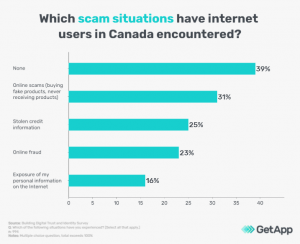Digital technologies support, activate, and mediate nearly all our social connections, economic activities, and institutional interactions these days. But when it comes to trust in our digital systems, nearly all of us can cite several factors that cause that trust to erode or be withheld.
 Those factors can include spam and phishing emails, account hacks, password exposure, bank or credit account theft, among many others. With the emergence of generative AI technologies, trust becomes even harder to confidently extend.
Those factors can include spam and phishing emails, account hacks, password exposure, bank or credit account theft, among many others. With the emergence of generative AI technologies, trust becomes even harder to confidently extend.
Today, about half of us say our digital trust in the organizations we deal with is lower than ever.
And that lack of trust can have a big economic if not societal cost, according to a recent survey of Canadian consumers about their levels of digital trust. When we show or extend our digital trust to a company, product or service provider, we expect our interests and values, not to mention our data and money, will be respected and protected.
If that trust is misplaced or misused, we can and do pull back. Be it a close friend or a first-time service provider, we naturally prefer to interact with someone or something that treats us with a consistent care and respect.
Some of us stop doing business with firms whose data protection practices we do not trust. It seems more of us are likely to do so.
The survey exploring Canadian consumers’ digital trust in online activities, including their specific privacy concerns and perceived assessments of cybersecurity, shows that very clearly:
Nearly 90 per cent of respondents said they would prefer to purchase from businesses with a good track record of safeguarding their clients’ personal information. Almost 80 per cent said they would switch brands if a company’s data privacy policies were unclear (much less manipulative, misleading, or a violation of existing law).
Conducted by GetApp, an international firm that helps small businesses make good company software decisions and purchases through analysis and comparison of key usability factors, the survey asked almost 1,000 Web users in Canada about their online behaviour and the considerations that inspire the most, or least, trust online.
The survey found that 61 per cent of people in Canada had experienced online fraud, scams, or data breaches. Of those affected, one quarter were scammed while trying to buy something on social media: they received a fake product or nothing at all.
“It seems Canadian Internet users have been burned by bad actors in a few different ways, which may be why trust in a brand’s reputation is an important factor for nearly a third of respondents when considering making e-commerce purchases,” described Tessa Anaya, analyst on the survey study. “Although there are a variety of factors that users consider when evaluating a site, most look for human-provided elements for reassurance, such as good user reviews and easily reachable customer service.”
Those evaluations of what makes for a trustworthy site include the amount or type of personal information that’s requested or gathered: 88 per cent of the Web users surveyed believe that businesses gather too much personal information from them, directly or indirectly: only 11 per cent of respondents said they trust businesses that use cookies to obtain personal data for commercial purposes.
While some do not mind the targeting or recommendations that Internet advertisers and business use that data for, 70 per cent said they did not like the practice.
In fact, 43 per cent of respondents said they had already ceased doing business with a company because of issues concerning their private information.

GetApp, a company that helps small business make business software decisions and purchases through analysis and comparison, surveyed almost 1,000 web users in Canada to find out about their online behaviour and the factors that inspire the most, or least, trust online.
In response to a data leak or breach, seven per cent of respondents said they had already taken legal action against a business, while almost half said they would consider doing so.
Consumer push back and reaction to an erosion of digital trust leads nearly 60 per cent to say they would stop patronizing a brand if they knew it collected and sold their personal data.
Just over a third said they would never again do business with a company that had a data leak!
(While individual data leak incident numbers do show a recent decline, the cumulative number of companies affected is staggering, based on a Statista Q3 2022 report.)
GetApp’s surveys underscore growing Canadians concern about digital technologies, be it our familiar connected devices or emerging new generative AI tools.
In fact, Get App says a majority of respondents would not trust synthesized answers to search queries from AI.
Another survey found that 17 per cent would “never trust” AI chatbots such as ChatGPT and Google Bard when searching online.
“The uncertainty users showed in using AI to synthesize a single answer to their search query using all available information is interesting,” analyst Tessa Anaya added in a press release. “Over three-quarters of respondents thought it’d be useful to some degree to receive personalized search results, which relies on AI to remember their past online actions and propose new information based on those. While users like personalized results, there seem to be limits on users’ faith in the capabilities of AI-powered search.”
When it comes to digital limits on faith and trust, it seems we may not be able to have our cake and eat it too.
-30-



